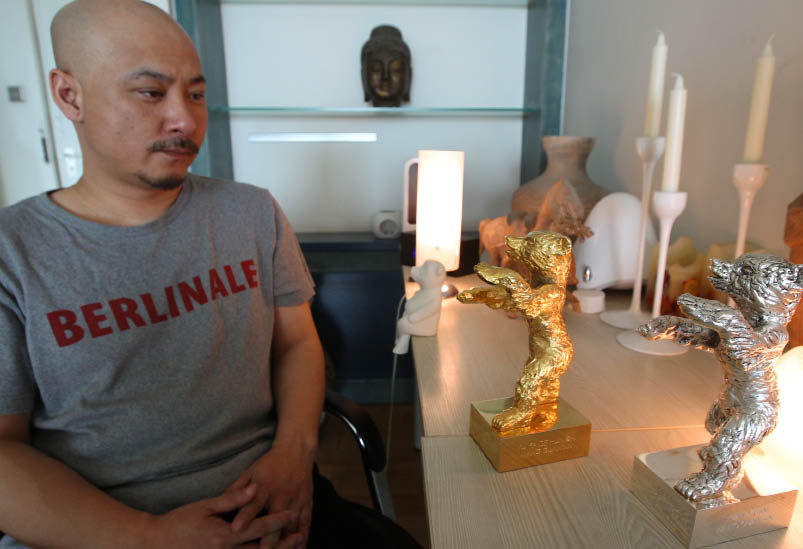Intelligent Chinese Films Hit the Mainstream
Not One Less, released in 1999, marked a new creative high for Zhang Yimou. All actors in the film are non-professionals, and they depict in a very realistic manner the status quo of Chinese education in rural areas. Zhang once candidly remarked that it was a plain, traditional and even trite film in terms of both plot and depth. But the film’s frank depictions of rural dropout children touched filmgoers and conquered the critics. It garnered a dozen domestic and international film awards including the Golden Lion Prize at the 56th Venice International Film Festival.
 |
| Director Wang Quan’an with his gold and silver bear awards from the Berlin International Film Festival. |
Fighting Successes
The new century has seen Chinese cinema go mainstream worldwide. In large part this has been thanks to the inclusion in plots of martial arts while maintaining story lines that continue to emphasize the plight of individual characters.
But Zhang’s The Road Home in 2000 saw the director explore themes similar to his earlier work. The film, historically set in revolutionary China, focuses on the love story of the narrator’s parents. It touched audiences and won another Silver Bear for Zhang at the 2000 Berlin International Film Festival. It also brought international fame for Zhang Ziyi in her feature debut.
After Ang Lee’s directorial work Crouching Tiger, Hidden Dragon won the Academy Award for Best Foreign Language Film in 2000, Zhang Yimou also began to steer his film production toward a greater role for martial arts. The first film marking this transition was Hero. Riding on Ang Lee’s success, Zhang secured a budget of US $30 million for the film, which pulled in almost US $180 million at the box office to become the highest-grossing Chinese-made film ever at the time.
On the success of the film, Zhang said: “Considering the huge investment, of course, I hoped both Chinese and global audience would see the film, and like it.” While commercial triumph was undoubtedly an achievement for Zhang, many moviegoers and reviewers were skeptical of Zhang’s new direction. Zhang’s hopes of an Oscar also came to naught; Hero was nominated in the Best Foreign Language Film category at the Academy Awards, but eventually lost to Nowhere in Africa, a German production. At the 53rd Cannes Film Festival, the film came away with only one award, for “special art contribution.”
After Hero, Zhang directed two more martial arts epics, House of Flying Daggers in 2004, and Curse of the Golden Flower in 2006. Similar to Hero, House of Flying Daggers was an international hit, but domestically received both praise and censure. As for Curse of the Golden Flower, critics were unmerciful in their criticism. As one remarked: “In his one-after-the-other films featuring impressive spectacles of dazzling color, Zhang’s pursuit of colorific grandeur has reached extremes. From Hero with a five-color background to Curse of the Golden Flower, which is dominated by yellow, all his recent films have displayed a relentless pursuit of ‘color art’ at all costs.” Many moviegoers said that while there were spectacular scenes, they weren’t entirely sure what the films intended to convey. For many domestic observers, it seemed that foreign audiences’ obsession with Chinese Kung fu was the sole reason for the films’ success abroad. For Chinese audiences accustomed to the Kung Fu genre, stunts and technical skill only went so far.
In 2011, Zhang began to dabble in the subject of war. He released The Flowers of War, a film with a massive budget of RMB 600 million. Christian Bale, Academy Award winner for Best Supporting Actor, was invited to play a starring role. The story is set against the Nanjing Massacre in 1937. The plot details how a group of female middle school students together with an American, a group of runaways from a brothel and a team of Chinese soldiers confront the massacre and fight against the Japanese invaders. In spite of the huge investment, participation of an international movie star and several well-known female Chinese stars in the film, its failure at the box office was a cruel blow for the film producer. One film critic remarked that Zhang had tried to commercialize the grand, serious and overwhelmingly sad theme of the Nanjing Massacre, and that resorting to war movie clichés and plot devices undermined his subject matter.
Chen Kaige also suffered a commercial failure, though perhaps not quite on par with Zhang’s in The Flowers of War. Chen’s The Promise is a Chinese epic fantasy film set in ancient China and starring famous movie stars from China, Japan and South Korea. In 2008, Chen returned to the subject of Peking Opera, a favorite of his, and directed Forever Enthralled, a semi-biographical film about Mei Lanfang, China’s best-known Peking Opera practitioner. In spite of the encouraging domestic box office, which surpassed RMB 100 million, globally the film failed to connect with audiences. Certain domestic film commentators remarked that with The Promise Chen ruined the credibility among audiences he had earned with Farewell My Concubine. Some even cynically suggested it would have been better had Chen retired after Farewell.

